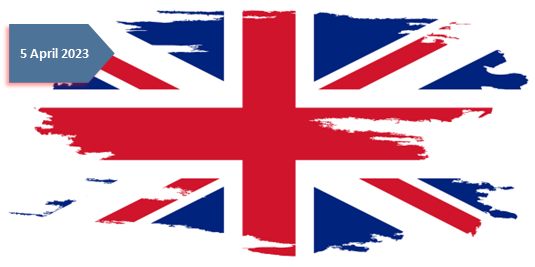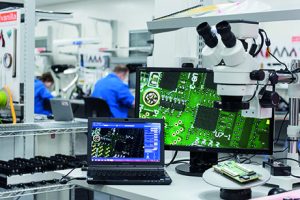
5 April 2023 | 4 min read
Finding a route through post-Brexit challenges often means verifying the authenticity and quality of electronic components from the EU, says TechPoint Chairman Dan Croft.
As the UK navigates around and through the swamp of complexities of post-Brexit trade agreements and customs regulations, supply chain management has become absolutely paramount. With the EU ceasing inspections on products entering the UK, businesses face the challenge of making sure that their supply chains are sticking to strict health and safety standards, tax regulations and other compliance requirements.
The risks are significant for businesses. All businesses have to think carefully about their electronics supply chains in this post-Brexit environment. While consumers are often concerned about the safety of food stuffs, the very real threat of sub-standard products extends to all consumer items. For businesses, the consequences of sub standard products and/or non-compliance products can result in serious financial and reputational damage.
Effective supply chain management is therefore critical to the manufacturing industry, not just the electronics industry. Managing a complex myriad of suppliers and distributors requires means serious time and investment, in ensuring high standards are upheld. This includes carefully checking and verifying the authenticity and quality of electronic components whilst also ensuring compliance with all applicable tax regulations.
Businesses must now be even more proactive in protecting their supply chains by implementing robust and meaningful quality control measures, conducting regular audits and ensuring the correct compliances with the regulations. Genuine collaboration with suppliers and other stakeholders is also vital – it does so much to help businesses to mitigate the risks and stay informed about changes in current customs regulations and trade agreements.
For supply chain managers in the electronic components industry, there are specific considerations after Brexit. Perhaps the most important consideration is simply ensuring that the electronic components that are to be used in the manufacturing process meet the required standards and are authentic.
Couple that to the fact that due to the global supply chain crunch there has been a rise in counterfeit components. As a result design engineers are often turning to unauthorised ‘grey market’ distributors. Counterfeit products can create several problems. Issues such as being a potential health hazard and/or notable lower performance. This is why investing in advanced technology, for example scanning electron microscopy and energy dispersive X-ray spectroscopy which can compare and detect counterfeit products is vital to protect businesses from using potentially faulty or unverified parts.
 Other and newer challenges for UK businesses can be found in verifying the authenticity and quality of electronic components coming from EU countries. This is particularly relevant for components that are vital to the performance and safety of electronic products. For example components that are used in medical devices, and the aerospace and automotive industries. We all remember during the Covid pandemic, there was a critical shortage of components for medical equipment, such as ventilator systems. Hopefully we are well and truly over the Covid situation, but to avoid a similar episode of this crisis, it’s important that the UK takes steps to secure the supply of vital electronic components.
Other and newer challenges for UK businesses can be found in verifying the authenticity and quality of electronic components coming from EU countries. This is particularly relevant for components that are vital to the performance and safety of electronic products. For example components that are used in medical devices, and the aerospace and automotive industries. We all remember during the Covid pandemic, there was a critical shortage of components for medical equipment, such as ventilator systems. Hopefully we are well and truly over the Covid situation, but to avoid a similar episode of this crisis, it’s important that the UK takes steps to secure the supply of vital electronic components.
And then, there’s the customs regulations and tariffs. Businesses need to stay well informed about changes in these regulations to ensure that they totally comply with all necessary requirements, avoiding any potential penalties. Partnering with dedicated professional supply chain experts that have the means and the resources to fully understand and implement the changing legislation will help businesses to manage better and mitigate disruption. UK businesses must also allow more time for exporting and importing goods to the EU as customs checks could extend lead times. We’ve seen plenty of coverage of this over recent months, and it’s a very real issue.
Nowadays there is an appetite for an increased focus on sustainability and ethical sourcing, meaning businesses also need to consider the environmental and social impact of their supply chain. For the electronics industry this means ensuring that suppliers adhere to responsible sourcing practices and that electronic waste is disposed of in an environmentally responsible manner.
It’s not difficult to have observed the general shift of attitudes in recent years towards sustainability. And customers too are very much becoming increasingly environmentally conscious in their purchasing habits, whilst at the same time regulators in the EU and UK are ramping up the legislation around sustainability and environmental issues as they aim for net-zero targets.
Supply chains possibly represent a company’s largest carbon footprint. Bearing this in mind, it is crucial that every link within a supply chain is carefully audited to ensure standards are being met. These days a poor ethical and environmental track record has the potential to significantly damage a company’s reputation.
Managing the supply chain of electronic components post-Brexit requires businesses to prioritise three key areas, quality control, compliance and sustainability. And by taking a proactive approach and working closely with suppliers and other stakeholders in the business, UK plc can mitigate the risks and ensure that their products meet the highest standards.
